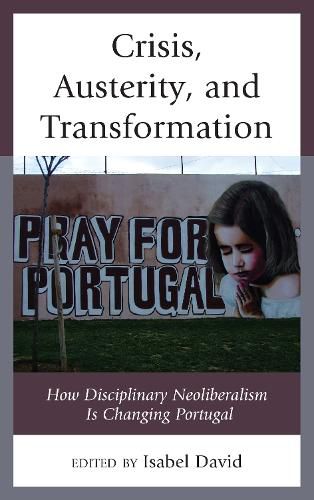Crisis, Austerity, and Transformation: How Disciplinary Neoliberalism Is Changing Portugal

Crisis, Austerity, and Transformation: How Disciplinary Neoliberalism Is Changing Portugal
Discussions of the recent austerity measures in Southern Europe as a response to the sovereign debt crisis have been usually framed in terms of their economic impact. However, the general impoverishment of these countries has induced other massive social and political changes, a fact which is ignored in the literature. This volume seeks to fill this gap and break ground by analyzing these trends in the Portuguese context.
Portugal has been portrayed as the Troika’s good pupil by obediently adopting all prescribed austerity measures. In the process, the nation’s fragile social fabric has been destroyed. Massive emigration, particularly by young people, massive increases in poverty and a foundering economy have triggered a collective framing of the crisis and austerity as unjust and punitive of a collectivity that, at the beginning, naively believed in the neoliberal narrative of the benign effects of the cuts. This reframing unleashed an unprecedented wave of social and political mobilization in an otherwise traditionally apathetic society. This resistance needs to be addressed as a direct effect of austerity policies and properly analyzed for what it really represents: a process of repoliticization and re-democratization sweeping Europe. These mobilizations include direct democracy experiments, the growing influence of social movements (the massive March 2011 demonstrations were a direct inspiration for the creation of the Indignado movement in Spain, attesting the contagion effect), solidarity economy and the major political change in the country’s 42 years of democratic rule: an alliance of the left parties, unthinkable before the crisis, and which is reframing relations with the European Union.
This volume offers a first approach to the massive political, social and cultural transformations taking place in the country that make Portugal, in certain aspects, a lab for innovative practices (e.g. participatory budgets and the alliance of the left parties) that may be used elsewhere as alternatives to current understandings of economic and political orthodoxy
This item is not currently in-stock. It can be ordered online and is expected to ship in approx 2 weeks
Our stock data is updated periodically, and availability may change throughout the day for in-demand items. Please call the relevant shop for the most current stock information. Prices are subject to change without notice.
Sign in or become a Readings Member to add this title to a wishlist.


